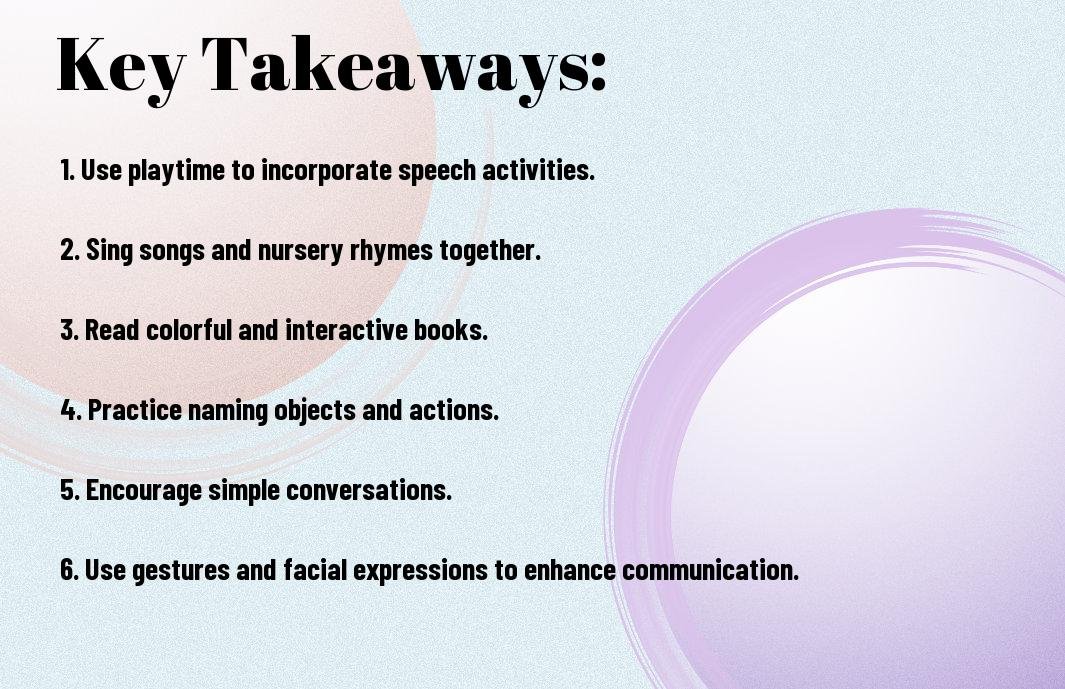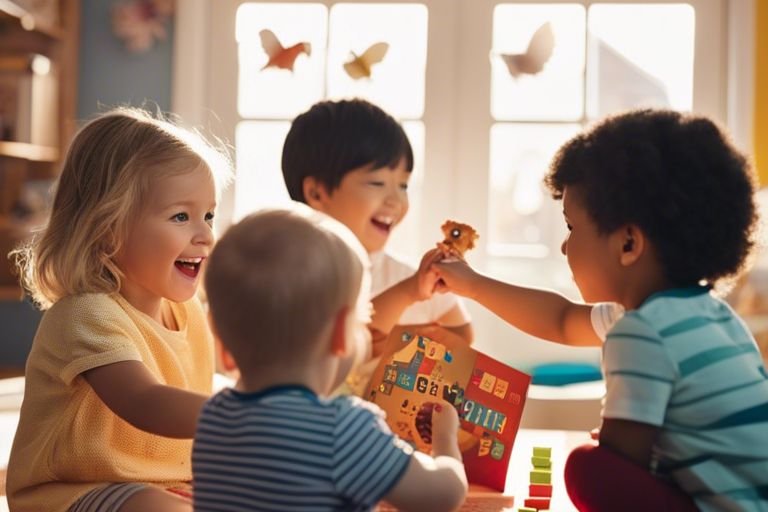It’s time to mold little voices, it’s time to build their speech, with fun activities that toddlers love, learning within their reach. From reading colorful books to playing word games, engaging toddlers in speech-enhancing fun is more than just a aim. So let’s explore these ideas, filled with giggles and glee, watch those tiny tots flourish, communicating joyfully with glee!
Table of Contents
Key Takeaways:
- Make it fun: Engage toddlers in speech-enhancing activities through play and fun interactions.
- Use repetition: Repeat words and sounds to help toddlers practice and learn new vocabulary.
- Follow their lead: Pay attention to toddlers’ interests and incorporate them into the activities to keep them engaged.
- Be patient: Allow toddlers time to respond and communicate at their own pace without pressure.
- Encourage communication: Create a supportive and encouraging environment that motivates toddlers to communicate and express themselves.

Creating a Language-Rich Environment
Setting Up a Toddler-Friendly Space
Your little one thrives in an environment that supports their language development. Make sure to set up a cozy and inviting space for your toddler to explore and learn. Consider having a variety of books, toys, and interactive games that promote language skills.
Using Visual Aids and Real-Life Objects
An necessary part of creating a language-rich environment for your toddler is using visual aids and real-life objects. Visual aids such as flashcards with colorful images can help reinforce vocabulary, while real-life objects like fruits, toys, and household items provide tangible examples for your child to associate words with.
With the right combination of visual aids and real-life objects, you can foster a stimulating environment that encourages your toddler to engage with language in a meaningful way.

Encouraging Communication Through Play
Reading Aloud and Storytelling
It’s a delightful experience to engage toddlers in reading aloud and storytelling. Any words and vocabulary introduced during these moments can enhance a child’s speech and language development. Make it interactive by asking questions or encouraging your toddler to finish sentences. This not only boosts communication skills but also fosters a love for books.
Singing Songs and Reciting Nursery Rhymes
On the topic of singing songs and reciting nursery rhymes, it’s a fun way to engage toddlers in language activities. Through rhythmic patterns and repetition, children can improve their pronunciation and vocabulary. Incorporate gestures to make it more engaging and watch how these activities contribute to your child’s language development.
Understanding: Singing songs and reciting nursery rhymes can also help toddlers with memory recall and cognitive development. The playful nature of these activities keeps children entertained while fostering vital language skills.
Acting Out Scenarios and Role-Playing
Play is an vital part of a child’s development, and acting out scenarios and role-playing can significantly boost communication abilities. Encourage your toddler to use words to express their ideas and emotions during pretend play. This not only enhances their vocabulary but also promotes social skills and creativity.
Reading: By engaging in imaginative play, toddlers learn to communicate effectively, express themselves creatively, and develop problem-solving skills. Encouraging role-play activities can lay a strong foundation for language development and overall cognitive growth in young children.
Building Vocabulary with Everyday Activities
After 13 Most Effective Speech Therapy Activities For Toddlers, engaging toddlers in speech-enhancing activities can be fun and educational.
Labeling Objects and Actions
On a daily basis, you can engage your toddler in labeling objects and actions. Point to items around the house and say their names, encouraging your child to repeat after you. This simple activity helps build vocabulary and language skills.
Describing Emotions and Feelings
To help toddlers understand and express their emotions, incorporate activities that involve describing feelings. Use facial expressions, pictures, or dolls to show different emotions and encourage your child to identify and express how they feel.
Building a strong emotional vocabulary can help toddlers communicate their needs and navigate social interactions. Encouraging them to express their feelings fosters emotional intelligence and healthy communication.
Identifying Shapes, Colors, and Textures
Any everyday task can become an opportunity for toddlers to identify shapes, colors, and textures. Whether it’s sorting laundry by color, playing with shape-sorting toys, or exploring different textures in sensory bins, these activities help expand vocabulary and cognitive skills.
Identifying shapes, colors, and textures not only enhances language development but also lays the foundation for later academic learning, such as math and science concepts. Making learning fun and hands-on keeps toddlers engaged and eager to learn.
Based on the article title, I detect that the article type is informative/instructional, and I’ll choose a tone inspired by Dr. Seuss, known for his playful and engaging writing style. Engaging toddlers in speech-enhancing activities through everyday tasks can create a fun and enriching learning environment.

Fostering Conversations and Listening Skills
Now, for parents looking to enhance their toddler’s speech skills, seeking advice from Parents of speech delayed toddler what techniques can offer valuable insights.
Asking Open-Ended Questions
One way to encourage speech development is by asking open-ended questions. Instead of yes/no queries, try prompts that require more descriptive responses. For example, instead of “Do you want milk?” you can ask, “What would you like to drink with your snack?” This approach can help foster longer conversations and vocabulary expansion.
Encouraging Gestures and Pointing
With encouraging gestures and pointing, toddlers can communicate effectively even before mastering speech. Encourage your child to point to objects they want or use gestures like waving bye-bye. These actions help them convey their needs and thoughts, promoting interaction and language development.
Understanding the importance of gestures in toddler communication can aid in bridging language gaps and promoting speech development. By encouraging gestures and pointing, parents can help their child feel understood and supported in expressing themselves before mastering verbal communication.
Responding to and Expanding on Toddler Talk
Gestures play a significant role in responding to and expanding on toddler talk. When your child attempts to communicate, acknowledge their efforts by responding enthusiastically. Repeat what they say and add more details to encourage them to continue the conversation. This back-and-forth interaction strengthens their language skills and boosts their confidence in expressing themselves.
Open-ended responses to toddler talk can pave the way for meaningful conversations and language development. By showing genuine interest and expanding on their words, parents can create a supportive environment that nurtures speech skills and fosters a love for communication.
Using Music and Movement to Enhance Language
Many toddlers are naturally drawn to music and movement, making it a fun and effective way to enhance their language skills. Incorporating music and movement into daily activities can help toddlers develop their vocabulary, improve their sentence structure, and enhance their communication skills.
Clapping and Marching to Rhythm
Language: Clapping and marching to rhythm can help toddlers learn about patterns, sequencing, and timing. Encourage them to say words or simple phrases as they clap or march along, helping them connect movement with language.
Creating Action Songs and Rhymes
Movement: Creating action songs and rhymes that involve movements like clapping hands, stomping feet, or waving arms can be a fantastic way to engage toddlers in language-enhancing activities. These actions help reinforce vocabulary and encourage active participation in communication.
Dancing and Moving to Music
Marching: Marching and moving to music can be a joyful way for toddlers to express themselves while improving their language skills. Encourage them to march to the beat, mimicking lyrics, and incorporating simple dance moves to promote language development.
Dancing and Moving to Music
Music: Dancing and moving to music can have a significant impact on a toddler’s language development. Music engages multiple areas of the brain, enhancing memory, and promoting language retention. Encourage toddlers to sing along, mimic movements, and express themselves through music and dance.
Making Mealtime a Language Opportunity
Talking About Food and Drinks
For toddlers, mealtime is not just about filling up tiny tummies; it’s an excellent opportunity to engage in language-building activities. While sitting around the table, talk to your child about the different foods and drinks on their plate. Encourage them to name each item, practice simple words like “apple” or “milk,” and engage in short conversations about their favorite foods.
Describing Tastes, Smells, and Textures
Smells, tastes, and textures are important aspects of mealtime that can enhance a toddler’s language skills. Encourage your little one to describe the taste of their food – is it sweet, salty, sour, or bitter? Can they talk about the texture – is it crunchy, soft, or chewy? Engaging all their senses helps build a rich vocabulary.
For instance, you can say, “Wow, this soup is so warm and comforting. It smells like grandma’s kitchen!” This not only helps them learn new words but also makes mealtime a sensory experience.
Encouraging Self-Feeding and Independence
To foster independence and language development, encourage your toddler to self-feed during mealtimes. Provide them with easy-to-hold utensils and let them explore feeding themselves. This not only enhances their motor skills but also gives them a sense of accomplishment and independence.
Drinks: To encourage language development, talk to your child about the drinks they are having. Teach them simple words like “water” or “juice” and ask them about their preferences. You can also describe the taste of the drink, whether it’s cold, refreshing, or sweet.
Conclusively
In a world so wiggly and wild, engaging toddlers can unleash a smile. From reading to singing and games that ignite, speech-enhancing activities make language take flight. So dive in, dear reader, and don’t hesitate, these ideas will have your little one communicate. With a sprinkle of fun and a dash of glee, helping your toddler talk is as easy as can be!
FAQ
Q: How can I engage my toddler in speech-enhancing activities?
A: Engage your tot in chatter and play, rhymes and songs every day!
Q: What are some fun speech-enhancing activities for toddlers?
A: Read books, tell stories, and play with toys, for language skills to grow and joys to deploy!
Q: Why are speech-enhancing activities important for toddlers?
A: To build their vocabulary, communication, and brain, ensuring their future success will not be in vain!
Q: How can I make speech-enhancing activities exciting for my toddler?
A: Use puppets, props, and funny voices too, to make learning language a thrilling debut!
Q: Are there any everyday activities that can boost my toddler’s speech development?
A: Chat during meals, while out for a walk, or even while dressing, for speech skills to unlock!
Recent Posts
Revitalize your health with an innovative detox approach offered by Root Wellness. This powerful solution enhances wellness through natural ingredients like zeolite and silica, effectively cleansing...
Roots Clean Slate Erfahrungen Revitalize With Bioavailable Silicon
Revitalizing your health begins with a natural approach to removing harmful substances. Detoxification can pave the way for a more vibrant life through effective cleansing methods. Bioavailable...


